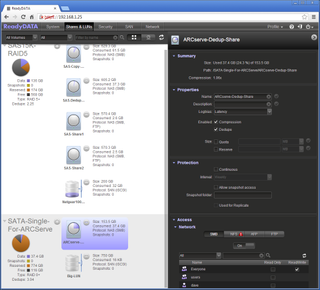Storage configuration and performance
For testing we created separate RAID-5 arrays on the SAS and SATA drives. Share access security is tight but for testing we checked the anonymous access box to allow unrestricted access to all users.
IP SANs are just as simple to create as you decide on a target name, a size and thick or thin provisioning. LUNs can be expanded into available volume space and even migrated on-line to another volume. They are exposed by placing them into a LUN group that defines the target name and enforces CHAP authentication or allows open access to all iSCSI initiators
For performance testing we called up the lab's Dell PowerEdge R820 rack server with its quartet of 2.2GHz E5-4607 Xeons and 96GB of DDR3 memory. The system was running Windows Server 2008 R2 Enterprise and equipped with an Emulex 10GbE adapter.
Moving directly to IP SAN testing over a single 10GbE connection saw Iometer report sequential read and write speeds of 656MB/sec and 540MBsec for a 200GB target on the SAS array. Running the same test on the SATA array saw lower speeds of 620MB/sec and 510MB/sec.
We then added the STEC SSD to the SATA array as a write cache and the Intel SSD as a read cache. Iometer now reported similar speeds to the SAS array.
Database performance will see benefits from SSD caching. Configuring Iometer with a database load comprising 16KB random reads and writes saw a 480MB/sec throughput on the SAS array. The basic SATA array returned 455MB/sec and enabling SSD caching saw this step up in-line with SAS speeds.

Netgear returned a comparatively low score in the Binary Testing data deduplication test suite
Deduplication tests
Deduplication is carried out at the appliance so is transparent to all host systems. To test data reduction ratios we used the Binary Testing deduplication test suite and CA's ARCserve r16 with it set to use a mapped share as a disk based backup device.
Using a 4GB data set of 1,000 files, we ran a standard backup strategy consisting of daily incrementals and weekly full backups. After the first full backup had run, 2 per cent of data was modified in 40 per cent of files prior to each subsequent backup.
At the end of a four week simulation we saw a reduction ratio of 3.04:1.This is very low but in-line with other ZFS based systems we've had in the lab.
Conclusion
With ZFS at the helm, Netgear's ReadyDATA appliances offer businesses a more sensible storage proposition than its ReadyNAS systems which suffer from too much consumer-related baggage. The 5200 offers a solid range of NAS and IP SAN features backed up by very good data protection and snapshot functions. Our only criticisms are that the hardware platform is dated and noisy and ZFS deduplication delivers low data reduction ratios.
Verdict
The ReadyDATA 5200 offers more business storage features than you’ll find in a ReadyNAS box. It’s easy to deploy plus data protection options and 10GbE performance are very good. Our only complaints are the ZFS deduplication delivers low storage savings and the hardware platform could be more up to date considering the price.
Chassis: 2U rack
CPU: 2.66GHz Intel Xeon X3450
Memory: 16GB 1333MHz DDR3 (max 32GB)
Storage: 12 x hot-swap SAS/SATA drive bays
Array support: RAID0, 1, 10, 5, 6, 50, 60, hot-spare, JBOD
Network: 2 x Gigabit, 2 x 10GbE
Other ports: 2 x SAS rear expansion
Power: 2 x 700W hot-plug PSUs
Management: Web browser
Dave is an IT consultant and freelance journalist specialising in hands-on reviews of computer networking products covering all market sectors from small businesses to enterprises. Founder of Binary Testing Ltd – the UK’s premier independent network testing laboratory - Dave has over 45 years of experience in the IT industry.
Dave has produced many thousands of in-depth business networking product reviews from his lab which have been reproduced globally. Writing for ITPro and its sister title, PC Pro, he covers all areas of business IT infrastructure, including servers, storage, network security, data protection, cloud, infrastructure and services.

